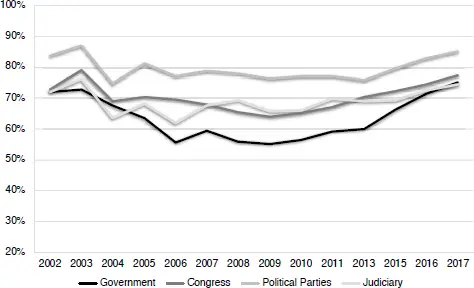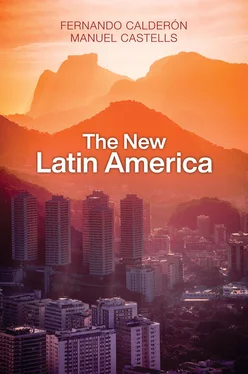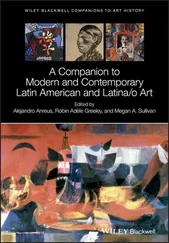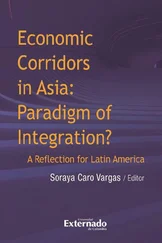At the same time, the consolidation of statist regimes, controlled by powerful political parties, led to the formation of a patrimonial and corporate state in which access to public businesses became a source of wealth, influence, and power for neo-populist movements, leading to widespread corruption in the political systems of almost all Latin American countries. The tradition of transparency characteristic of democratic politics in Chile was questioned, as networks of corruption were exposed both among conservative politicians and among those of the Nueva Mayoría (or New Majority, formerly the Concertación). This scandal even reached the family of President Bachelet, undoubtedly a moral person.
In addition, the state’s vast powers were shored up in several countries through the repressive strategies implemented by police forces (sometimes with help from foreign countries), which developed into bureaucratic actors whose presence could be felt throughout societies. New generations – raised in democracies, educated, informed, and used to communicating on the internet – resented the crushing presence of the patrimonial state. Statism could not stifle the ethical demands and demands for freedom put forward by young people participating in various social movements.

Figure 1.3: Distrust of Institutions: Totals for Latin America, 2002–2017 (%)
Note: Totals of responses expressing little + no trust
Indeed, public distrust of institutions is on the rise in almost all countries in the region (see figure 1.3). In 2016, the proportion of citizens who expressed distrust in both political institutions and the state was at least 63 percent, except in Uruguay, where the proportion drops to 51 percent (ECLAC, 2018a).
The convergence of the critique of inhuman development, the denunciation of state and political corruption, and the worsening of living conditions caused by economic stagnation and the politics of austerity triggered a rise in social movements in several countries, especially Brazil, Venezuela, Nicaragua, Chile, and Mexico. These movements directly challenged political regimes and their policies, and their demands focused on alternative forms of political representation.
Originally, these movements – in 2013 in Brazil, for example – were spontaneous and represented a younger population, which called for better societies. But they were soon joined by other middle-class sectors worried about the loss of their benefits, as in Venezuela or Brazil in 2015. Societies were broken apart, and the legitimacy of neo-developmentalism and its agent, the state, gradually dissipated.
In 2015, Latin America entered a period of economic uncertainty and political instability. The new social structure formed during the period of growth during the 2000s ceased to correspond to the political agents who had reached positions of power thanks to their fight against neoliberalism. Latin America lived through conflicts and contradictions during the first decades of the twenty-first century, overcoming both neoliberalism and neo-developmentalism. In this way, the region was led into a multidimensional crisis. This consisted of three interrelated crises: a crisis of neoliberalism, a crisis of neo-developmentalism, and a crisis of political and institutional legitimacy resulting from the failure of both of these models.
Neoliberalism exacerbated inequality, which was not remedied by neo-developmentalism. For its part, neo-developmentalism exacerbated statism and thus corruption, because interests moved from the market to the state. The political system’s crisis of legitimacy extended to institutions, causing lasting conflicts among groups wielding power, which enlisted judges and the media in their fights with one another. The absence of mechanisms for the aggregation and institutional negotiation of interests led to a complex crisis. This crisis is not essentially economic, given the region’s dynamic integration into the global economy; nor is it essentially social, given that in the majority of countries poverty has been reduced, together with extreme poverty and even inequality. It is a crisis of values and a generalized crisis of confidence, one that has led to a sordid and lasting conflict between actors, to the breakdown of any kind of consensus, and to the absence of shared rules of engagement.
Moreover, a symbiotic relationship between the logic of institutions in crisis and the logic of the rampant criminal economy heightens uncertainty. The state’s infiltration by drug traffickers emerges as a national problem, but even more so a regional and local one, not only in Mexico, Colombia, or Peru, but also in Brazil.
And thus, on this historical basis, various national situations intersect, in a set of multicultural transformations in public space and communications. It is, however, in the political system and in the state that the crisis is concentrated, and it is here that the limits of the new Latin American reality are becoming apparent.
1 1. For more detail, see BID (2016).
2 2. https://elpais.com/especiales/2016/guerra-narcotrafico-mexico/
2 A NEW SYSTEM OF PRODUCTION Informational Extractivism and the Globalization of Markets
Extractivism is one of the main economic and cultural characteristics of Latin America and the Caribbean, one that has determined the place of our economies and societies in the world. We are, and we are seen as, countries with extractive economies and cultures, despite various efforts at industrialization, import substitution, and social integration.
Argentina’s name comes from the silver mined in Potosí, and Brazil is named for a type of wood ( pau brazil ). Sergio Almaraz Paz’s El poder y la caída (Power and the Fall from Power) is a magnificent book that recounts the political and economic drama of tin mining in Bolivia. Fernando Ortiz considers the economies and cultures that center on tobacco and sugar in Cuba. For his part, Gabriel García Márquez shows in The Autumn of the Patriarch how a tyrant ends up selling off the Caribbean Sea, leaving only sand. Manuel Ugarte’s essays highlight the emancipatory hopes associated with the idea of the Patria Grande or Great Homeland, and in Open Veins of Latin America , Eduardo Galeano considers the frustrations, pains, and obstacles that the region has faced. All are associated with extraction.
A great deal of literature in sociology and economics hinges on the question of how to characterize extractivism, and how to leave it behind in order to industrialize Latin America. The works of Torcuato Di Tella, Alain Touraine, and others on coal and iron mining, or on the trade unions in Lota and Huachipato, Chile, are classics in the field. Fernando Fajnzylber’s proposals for productive transformation “with equity,” promoted by the Economic Commission for Latin America and the Caribbean, represent efforts to overcome a primarily extractive system.
Natural resources – land, mines, oil, and water – and the forms of social organization that first arose under colonialism to manage them – including the hacienda system first and foremost – together created a prison, a place for the exercise of domination and the confinement of resistance. This is the history that weighs on all of Latin America, despite national differences.
Calderón’s study Navegar contra el viento: América Latina en la era de la información (Sailing against the Wind: Latin America in the Information Age, 2018) suggests, among its main conclusions, that the region has witnessed the emergence of a new type of extractivism in recent decades, one that the author calls “informational.” That study suggested that this constitutes the primary way in which Latin America’s economies participate in globalization. In effect, the region was undergoing a sort of transition from industrial to informational extractivism, but to note that this was not to deny the importance of organized labor or of the world of informal work, statistically the most significant type of work in the region. For their part, communities of indigenous and African descent constituted a resource for, but also a source of resistance to, these new economies.
Читать дальше













